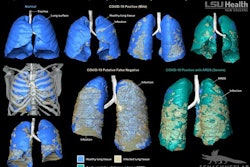Dear AuntMinnie Member,
When disinfecting ultrasound rooms, don't forget to address the issue of air sanitation, according to a new paper by Chinese researchers. Our article on their advice was the top story of the past week on AuntMinnie.com.
The advice was part of a set of guidelines issued by four medical societies in China in response to the novel coronavirus pandemic. The guidance covers surface decontamination, but it also addresses air sanitation through the use of ultraviolet lights, hydrogen peroxide sprays, and plasma air disinfection machines.
In other ultrasound news, Italian researchers have reported on the utility of point-of-care ultrasound for COVID-19 patients. They found that performing lung ultrasound scans can help reduce the number of false-negative results that occur when patients are tested with only reverse transcription polymerase chain reaction.
For these stories and more ultrasound news, visit our Ultrasound Community.
CMS delays RO Model
On the eve of this week's American Society for Radiation Oncology (ASTRO) virtual meeting, radiation oncology providers got a dose of good news from the U.S. Centers for Medicare and Medicaid Services (CMS). The agency announced on Wednesday that it was delaying by six months the start of a major change to radiation therapy reimbursement.
CMS had proposed the Radiation Oncology (RO) Model, a new reimbursement structure that would pay for patient treatments as a bundled single episode of care, rather than on the basis of individual therapy sessions -- a model that creates an incentive to force patients to return for a greater number of treatments.
While radiation oncology providers didn't object to the general idea of the RO Model, they felt that CMS was jumping the gun by setting an implementation date of January 2021. The six-month delay in implementation announced this week should give all parties more time to prepare.
In other radiation oncology news, a new report from IMV Medical Information Division indicates that the COVID-19 pandemic has not affected radiation therapy providers as dramatically as it has diagnostic radiology sites. IMV found that radiation therapy volume has been relatively stable throughout 2020.
Get these stories -- and more coverage of ASTRO 2020 -- in our Radiation Oncology Community.
CT of drug use
Finally, be sure to visit our CT Community, where you'll find a variety of new articles on this workhorse modality, including the use of CT to visualize the clinical manifestations of recreational drug use, the use of spectral CT for early assessment of COVID-19, and the use of artificial intelligence to help single-energy CT achieve the performance of dual-energy scanning.
Disclosure notice: IMV Medical Information Division is a sister company of AuntMinnie.com.



















